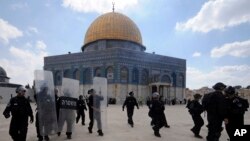Two mosques at a sensitive Jerusalem holy site will be exempt from monitoring by security cameras, Jordan's king said Thursday, in an apparent attempt to allay Palestinian concerns about his plan to install the cameras inside the hilltop compound.
The compound has been at the epicenter of current Israeli-Palestinian violence. Jordan, the custodian of the site, last month proposed security camera monitoring in efforts to defuse tensions. Israel welcomed the plan but the idea was met by Palestinian criticism.
Although Israel and Jordan initially said cameras would be installed within days, the plan now appears delayed, with Jordan's King Abdullah II saying they wouldn't be in place for some six weeks.
“To be very clear, there will be no cameras inside the mosque,” Abdullah said.
The walled, 37-acre (15-hectare) compound in Jerusalem, known to Jews as the Temple Mount and to Muslims as the Noble Sanctuary, is a frequent flashpoint and its fate is a core issue at the heart of the Israeli-Palestinian conflict. It is the holiest site in Judaism, and was the home to its biblical Temples. Muslims believe it is the spot where the Prophet Muhammad ascended to heaven. It is the third holiest site in Islam and houses the Al-Aqsa Mosque and gold-topped Dome of the Rock.
The current wave of violence erupted in mid-September, fueled by rumors that Israel was trying to increase the Jewish presence there. Under a decades-old arrangement, non-Muslims can visit the site but are not allowed to pray there.
Israel has vehemently denied the allegations, but Palestinians point to an increase in visits by extremist Jews backed by hardline Israeli legislators as proof.
The plan to introduce cameras at the site was suggested by Jordan and announced by U.S. Secretary of State John Kerry during a diplomatic push last month to quell the violence.
Israel praised the idea, saying it would help counter the Palestinian claims that it is trying to change the status quo. But the Palestinians said Israel would use the cameras to spy on and arrest people. Israeli police and Palestinian protesters often clash on the site, with the protesters usually barricading themselves inside the mosque and sometimes throwing stones and firebombs at Israeli forces.
There was no immediate Israeli response to Abdullah's remarks.
Beyond the video surveillance, Kerry last month also announced other understandings, including Israel fully respecting Jordan's “special role” as custodian of the site, upholding the ban on non-Muslim prayer and its commitment not to divide the site and to reject any attempt to suggest otherwise.
It was hoped that Jordan's engagement could go a long way in easing the tensions. Israel captured the holy site from Jordan in the 1967 Mideast war. But under a longstanding arrangement, Jordan maintains custodial rights over the Muslim holy sites through an organization called the Waqf, and since signing a peace treaty with Israel in 1994, has often served as a mediator. When similar tensions erupted last year at the same site, Jordan briefly withdrew its ambassador from Israel and tensions subsequently abated.
Abdullah said the cameras would be brought from Jordan and that the plan was to build a control room in the compound under control of the Waqf that would provide a feed to Jordan. It was not clear what Israel's role in the surveillance would be.
The current outburst of violence began in Jerusalem then quickly spread across Israel, the West Bank and the Gaza Strip. Eleven Israelis have been killed in Palestinian attacks, while 70 Palestinians have also been killed - 44 of them said by Israel to be attackers and the remainder killed in clashes with Israeli troops.




